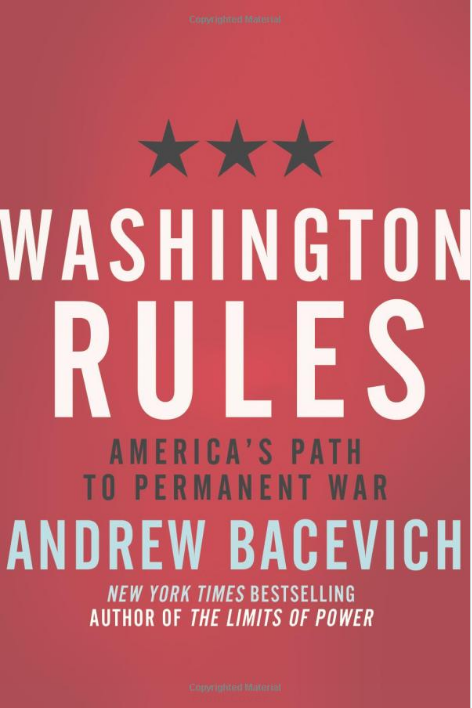Book Review by George Kennedy

This trenchant, incisive analysis of the “basic edifice of [American] national security policy” confirms what many of us have concluded since the end of the Vietnam War: the foundation for our national security policy – or, shall I say, cornerstone – is the concept of permanent war; wars of infinite duration with their permanent claim on an increasing share of national budgets.
The author transports us on a journey through American policy over the past several decades revealing a preference by our military and political leadership for a permanent global presence. What has evolved is a national security credo that each occupant of the White House holds sacrosanct, including the current incumbent. The credo is that “the United States alone was summoned to lead, save, liberate, and ultimately transform the world.”
Furthermore, this exercise of “global leadership obliges the United States to maintain military capabilities staggeringly in excess of those required for self-defense.” To this credo, there is the sacred trinity: “an abiding conviction that the minimum essentials of international peace and order require the United States to maintain a global military presence, to configure its forces for global power projection, and to counter existing or anticipated threats by relying on a policy of global interventionism.”
Together, credo and trinity (one defining purpose, the other practice) “constitute the essence of the way that our national political leadership has attempted to govern and police the American Century.” Whatever happened to the notion of “consent by the governed?”
Bacevich makes the case, and convincingly, that legions of colonels, generals, politicians, and their acolytes in academia and think tanks have redefined for the average American citizen their time-honored “responsibility to contribute to the country’s defense.” That relationship has been “radically revised – indeed severed.”
We now “rely on volunteers who fill the ranks of a professional military establishment only loosely connected to American security.” Is it any wonder that the average American feels disconnected from the wars in Iraq and Afghanistan unless they have a family member serving? The upshot is that an all-volunteer force satisfies the interest of a larger society to pursue “wealth, celebrity, and personal license” – autonomy, and the “semi warriors” the freedom to “employ American military might, however, they see fit.”
The author concludes and, I believe, rightly so, that neither political party “concerns itself with the question of whether this arrangement accords with commonplace notions of fairness or efficacy.” the arrangement is convenient for the American people and for Washington “semi warrior” class. The question I raise is have we become so inured to this shift in policy emphasis that it is secondary to all other public policy issues worthy of our attention? There was a period preceding World War 11 in which Americans “viewed military power and institutions with skepticism, if not outright hostility.”
Over the past six decades, the author maintains that there is now “an affinity for military might as central to the American identity.”
I liked this book because it is rigorous and because it rings of authenticity. It is a cri de coeur to the American people; that if national security policy is to change, it must come from them. “We either awaken to the fact that [we’ve] been had” or we become compliant in the inevitable outcome of waging permanent war while losing the heart of our democracy. A good read for the serious student of national security policy.
Andrew J. Bacevich, a professor of history and international relations at Boston University, retired from the U.S. Army with the rank of colonel. He is the author of The Limits of Power and the new American Militarism. His writing has appeared in Foreign Affairs, The Atlantic, The Nation, The New York Times, The Washington Post, and The Wall Street Journal. He is also a member of the Council on Foreign Relations.
